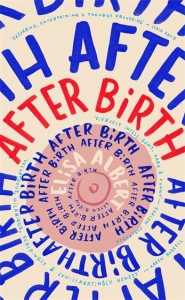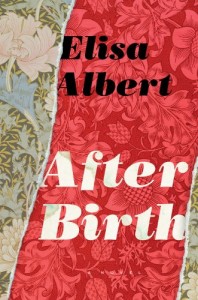 Published by Chatto & Windus UK, Houghton Mifflin Harcourt US
Published by Chatto & Windus UK, Houghton Mifflin Harcourt US
208 pages
Reviewed by Elsbeth Lindner
Dyspeptic, caustic, corrosive – possibly none of these terms does justice to the bitchy, no-prisoners-taken, harsh-as-paintstripper voice of Ari, the narrator of Albert’s second novel.
Yes, the title is a giveaway. This is fertility fiction – woman has baby (via C-section), woman struggles with her postpartum depression (augmented by the baggage she was already carrying), woman gets over it. But it’s hung about with a great deal more lacerating observation than that. Ari is the granddaughter of a Holocaust survivor who later committed suicide. The grandmother’s recourse, after multiple miscarriages, to fertility drugs meant that Ari’s own not-so-good mother would die early of cancer.
Ari is furious with the medical establishment at every level – for her own C-section; those fertility drugs; the contraceptive pill she was prescribed far too early, and so on. But she’s also furious with women generally, especially those who don’t breastfeed, as well as women with narrow horizons, entitled brides, women who let her down at various junctures, and of course with herself above all, for her own failures and limitations, which would include her first bash at motherhood.
Ari’s self-loathing and despair are lifted for a while through her friendship with Mina, the tenant who temporarily moves in next door, a heavily pregnant cool girl (ex-pop singer) who gives birth naturally, thereby allowing Ari to confirm her own medicized experience was a form of rape. When Ari steps in to help Mina breastfeed, she can also impart some of the wisdom and confidence she has painfully gained herself. The two women bond and breastfeed each other babies. Things are looking up, until Mina announces she is moving on.
Inevitably – intentionally? – Ari’s unremittingly scorching point-of-view wears the reader down after a time. Yes, she’s a sympathetic enough figure, with her troubled past and contemporary struggles. However the effing and scorning of almost everyone else, past and present, even in the cause of feminism and doing a better job, becomes monotonous, and a form of breast-beating martyrdom.
Nor is there an earth-shattering turnaround to conclude proceedings. Ari may, simply, have learned to cope a bit better, and to have decided she is in love with her husband (a matter of debate at one point) as well as her baby. Perhaps she has found a way to improve her relationship with her mother. Baby steps.
Intelligent and fierce this novel may be, with plenty of ‘you go, girl’ messages, but vituperation alone, though fun to write, isn’t quite enough. Next time, here’s hoping Albert extends her range. She’s undoubtedly capable of it.
